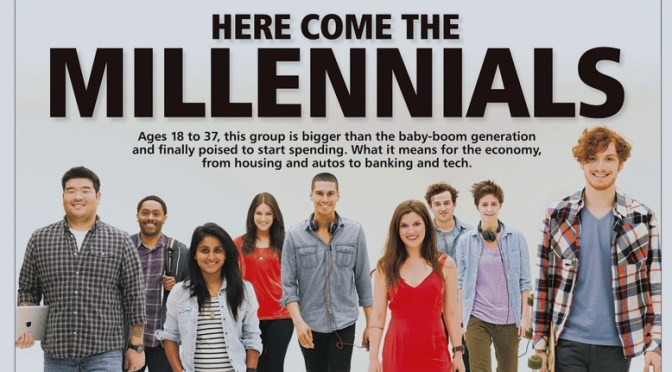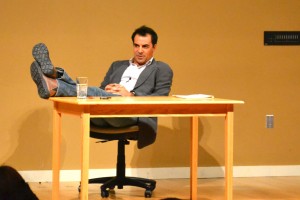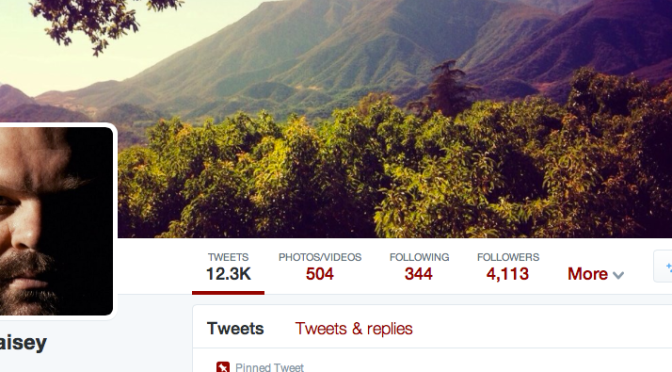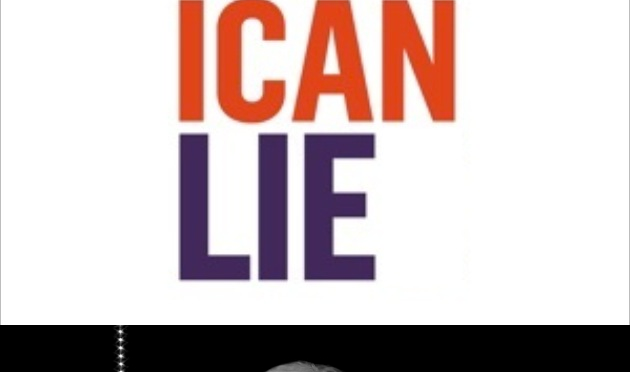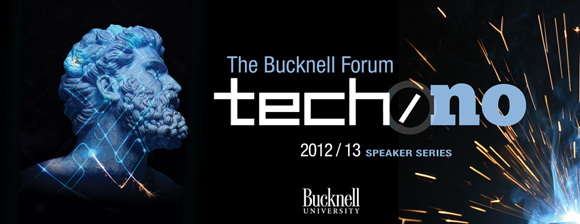“My cultural background is slightly different, am not that crazy into social media and feel I politically lean differently than many of my peers” were some of my thoughts that raced through my mind before I took the quiz on PewResearch.com. And behold-91 out of 100. I am much more of a millennial than I thought, even though I grew up in a different culture. This made me realize how Millennials are much more connected and much more aware of society worldwide, making them prepared to deal with the challenges that the U.S. and the world faces.
Tag Archives: this american life
“The story does not end here…”
This was originally written here.
I have edited a few sentences to reflect changes.
SPRING 2012
Almost no one calls me in my office. 90% of the calls are my wife or a textbooks ales representative (poor souls- they are ever-optimistic.).
So, when the phone rang two weeks ago, I answered it very informally. “Unh, hello?”
“Is this Jordi?” I didn’t have time to realize I should have recognized the voice. “This is Mike Daisey.”
@MikeDaisey
As I began searching the Internet to find out what Mike Daisey has been up to these days, I found myself on his Twitter account. On his Twitter profile, I learned that he has been preparing to release a new book, Here at the End of Empire, sometime during the 2015 year. Continue reading @MikeDaisey
Defining Words: A 1st Grade Skill is Still Applicable to Adulthood
When reading a news article or listening to a news podcast, how do you decide what to believe? Do you take everything at face value? Do you fact-check? The answer differs for each individual. It also differs based on who is reporting the news. But what happens when something written for artistic purposes is reported as news? The answer: the “Retraction” on This American Life of Mike Daisey’s story on Foxconn.
Continue reading Defining Words: A 1st Grade Skill is Still Applicable to Adulthood
“Because I think it made you care”
I empathize with Ira Glass’ in his anger toward Mike Daisey. The Mike Daisey mishap is an embarrassment to This American Life. Ira Glass and producer Brian Reed both vouched for the validity of a story that turned out to be false. T.A.L. was arguably justified in retracting the radio show for its journalistic errors. The issue, however, is that Mike Daisey is not necessarily a journalist. Mike Daisey is an actor, or a type of activist. He stated, “My mistake, the mistake that I truly regret is that I had it on your show as journalism and it’s not journalism. It’s theater. I use the tools of theater and memoir to achieve its dramatic arc and of that arc and of that work I am very proud because I think it made you care, Ira, and I think it made you want to delve.” Though he does so retroactively, this quote has great importance. It is less important to me as to whether Mike Daisey thinks his work is journalism or art. What is important to me is the goal of the ‘act’ in Daiseys mind. Daisey goes on to talk about how his fabrications were woven into his narrative of his trip to China because people had lost interest in the Foxconn scandal. This is taking his apology to be truth, which I am hesitant to do. “[…]And he says that made a strong impression on him, seeing the coverage vanish like that, seeing people suddenly not interested in the workers there anymore[…]And he wanted to make a monologue that would make people care. That was his goal.”
Be Careful What You Believe
I can personally say that I felt somewhat embarrassed as Ira Glass began to break down Mike Daisey’s arguement or monologue that we listened to last week. Last Sunday, I typed out a blog post on this same Apple laptop that I’m using now about how I was startled by the “truths” Daisey appeared to expose about Apple and Foxconn. I wondered aloud what types of hardships the people who produced my keyboard faced while making it. Additionally, I believed Daisey to be sincere, passionate, and trustworthy. I thought he was the real deal, and he was doing a fantastic job of raising awareness to what really happens at Foxconn. Seeing as Daisey’s monologue was the most downloaded podcast in the history of This American Life, I’m sure I’m not alone in this situation.
All the air has come out of the sails at this point. Every minute, Daisey’s assertions such as 12 year old workers, underground union meetings at Starbucks, injured hands, and guards with guns were broken down and proven to be false. The more I think about it, Daisey’s details were questionable even the first time I heard them. However, he told a great story, and the passion in his voice made me want to believe what he was saying. I wanted to believe he was truly trying to make a difference, and not simply advance his personal career. “Everything in this monologue is built out of my trip.” This is the line Daisey answers with when asked if he simply lied to his listeners. Clearly afraid of the negative connotation surrounding the word “lie”, Daisey pauses for a long time before dodging the question with this answer. Last week, he seemed to burst with confidence and could do no wrong. Now, he sounds defeated. He seems more concerned about saving his reputation then conveying to the listeners what the truth actually is.
This is what the problem with this situation really is. I don’t doubt that Foxconn has many issues, and Apple needs to take action in some areas. I believe that the Foxconn employees do face poor conditions and a lack of worker’s rights. The problem with what Daisey did is that he takes all the good out of his argument, and forces people only to focus on the lies that he told. The Mike Daisey Foxconn story is now about Mike Daisey, and not Foxconn. He did a good job raising awareness and getting the word out there about Apple and Foxconn. However, all of that is gone now because Daisey chose to exaggerate the story and advance his career instead of focusing on honest reporting and getting the facts right. He lost all credibility. I take away from this experience a lesson about how one always needs to take news or stories they come across with a grain of salt. Mike Daisey did a lot of good things, but his failure to act ethically and with integrity tore down what once was an extremely powerful story.
“Yes Cathy, I’m going to lie to lots of people.”
Would working conditions really be different oversees if we, as Americans, demanded different working conditions? Come to think of it, would we really even take the time to demand different working conditions? Would we really boycott the products that we are so obsessed with until Apple gave their suppliers a greater profit margin? While I am confident that there would be some Americans who would do so, I am uncertain that the majority of Apple consumer would take such actions. Doing so would likely be “too inconvenient” or “too much work.” Well, yeah, so is working 24 straight hours in an awful factory just to produce that device that is glued to your hand 24 hours a day. So maybe we should reconsider which of these situations is a bigger burden.
I know, easier said then done, right? I, for one, believe there would be a SIGNIFICANT amount of change in working conditions in Chinese factories if Apple were to provide their suppliers with a greater profit margin. To be honest, it’s not like Apple is financially struggling to exist or anything. It is outright selfish and unethical for Apple Inc. to exploit the lives of others at the expense of their own greed and desire for greater profitability. If Apple were to give their suppliers even a slightly larger profit margin, how much do you think the company’s total revenue would suffer on the year end financial statements? I believe it is safe to assume that providing said suppliers with a greater profit margin, on behalf of better working conditions for hundreds of thousands of people, would not put them in to debt. Perhaps, such actions would actually attract more consumers, who, perhaps may have boycotting Apple products due to their unethical practices and conditions.
Switching gears to the other main concern of This American Life’s: Retraction, I find it to be quite egotistical of Mike Daisey to deceive thousands of people at the expense of his own career. I believe it to be both astonishing and outright stupid that he would be so senseless to lie about details that can easily be researched by any listener. For example, the population of Shenzhen- just type “Shenzhen population” in to Google, and there it is. Or, stating that the guards outside of the factories had guns, when, anyone who may have traveled to China, or reported on the events at these factories, could tell you that only the Chinese military and Chinese police carry guns. With this information in mind, I have to question Daisey’s moral character based on what he mentiond during the podcast about admitting to the fact that he continued to lie to This American Life, even when the radio show contacted him regarding the validity of his information. Daisey not only put his own reputation on the line, but the reputation of the radio show, by letting them report false information.
Daisey mentioned that he “was kinda sick about it. Because [he knew] that so much of [his] story [was] the best work [that he] had ever made.” Hearing him say this really, really made me upset. I sincerely believe he did not “feel sick” for having lied to so many people, and that he did not sincerely feel bad for making a mockery out of a dire situation for his own individual professional gain and benefit. He just felt sick that he had been caught. Finally, I find it quite interesting that Mike Daisey chose to use the word “made” in describing the quality of his work. While he probably used this word in reference to his monologue, I believe his word choice further builds upon the fact that he “made” this story up by combining his own experience with the experience of others. While I understand that Daisey wanted to make people care about the situation, he very easily did not have to go to the extent that he did to convenience thousands of people that these were his own personal experiences. Just like he admitted to Cathy, he was well aware of the fact that he was lying to lots of people.
Blog 2- Art, Truth, and Lies
What is truth? Lies? Who gets to decide?
Now things get complicated. You heard This American Life’s podcast focusing on Mike Daisey’s monologue-play and the issues it raises about Apple, China, worker rights, us as consumers, and globalization. Continue reading Blog 2- Art, Truth, and Lies

